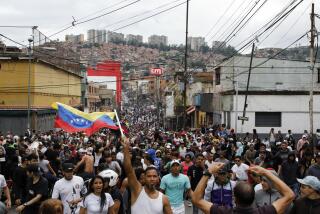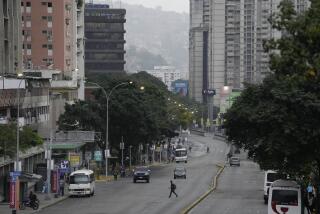Spanish voters back Socialists
MADRID — Spaniards on Sunday reelected Prime Minister Jose Luis Rodriguez Zapatero and the ruling Socialist Workers Party, turning out in large numbers after an acrimonious campaign that accented deep divisions in Spanish society.
But the Socialists defeated the right-wing Popular Party by a narrow margin and fell short of gaining an absolute majority in the lower house of parliament. That could hamper their ability to govern and foreshadow another four-year term possibly as contentious as the one coming to an end.
Waving red-and-white party flags and chanting the name of their leader, jubilant Socialists celebrated outside their party headquarters in Madrid and across the country. Spain’s last national elections, in 2004, came three days after the country suffered continental Europe’s deadliest terrorist attack.
“The Spanish people have spoken clearly,” Zapatero said in a victory speech to the crowd. “They have agreed that it is time to open a new era, a new era without the hostilities, an era that excludes confrontation and seeks agreement.”
A politician not known for his charisma, Zapatero, 47, beamed as he pledged to pursue the liberal social reforms that he launched in his first term but to also “correct mistakes,” offering “a firm hand, but an outstretched hand.”
He stood behind a huge red lectern in the shape of a Z, for Zapatero.
The prime minister opened his remarks by paying homage to the five people killed by Basque separatists during his government, including a Socialist activist shot to death less than 48 hours before the election.
At the Popular Party headquarters, supporters were as noisy as if they had won. The party’s prime ministerial candidate, Mariano Rajoy, and other party leaders conceded defeat but pledged to continue waging a sharp opposition. Despite its loss, the Popular Party won more seats than it did in the last election, which allowed supporters a measure of hope.
“Everyone knows what we believe,” Rajoy said from the balcony of his party headquarters. “Everyone knows the values we defend. We will rise to the circumstances.”
The Socialists won 169 seats in the 350-seat lower house, five more than in 2004 but seven short of the absolute majority that would have eased their ability to govern. With 154 seats, six more than last time, the Popular Party remains a major force.
With a once-robust economy starting to sour and a resurgence in political violence, turnout was high for Sunday’s vote. Election officials said more than 75% of the 35 million eligible voters cast ballots, equaling the turnout in 2004, when train bombings by Islamic militants drove people, especially first-time voters, to the polls in near-record numbers.
At the time, many voters were furious with the then-ruling Popular Party for attempting to blame the attacks on Basque separatists even as evidence pointed to Islamic militants. Voters also sought to punish the government for involving Spain in the U.S.-led Iraq war, which the overwhelming majority of the country opposed.
Spain’s left and right have been badly polarized since.
On Sunday, one common theme ran among voters on both ends of the ideological spectrum. Several people interviewed after they cast their ballots said they wanted a more civil political atmosphere in which leaders worked to find compromise rather than attack one another endlessly -- the kind of destructive standoff that has characterized the last few years of government.
“I’d like to see a new legislature in which they don’t go after each other like attack dogs,” said Ignacio Fernandez, 42, a bespectacled college professor who voted for the Socialists in his funky Madrid neighborhood of Lavapies.
Support for the Socialist Party was strong in Lavapies, an area of immigrants and the working class with patches of gentrification.
“Spain is a more modern country under the Socialists,” Fernandez added.
His mother-in-law, Maria Teresa Gomez Baez, 66, a retired child-care worker, agreed. “The laws used to be very machista,” she said.
She praised the government’s advances in family leave and support for women in the workplace.
Few complained about immigration, even though the Popular Party sought to make it a major campaign issue.
In a sunny Lavapies plaza Sunday, elderly Spaniards in wool coats and plaid berets sat on a bench, while young Latin Americans and Africans played with their children.
Across town in the upscale Salamanca neighborhood, where streets are cleaner and buildings regal, support for the Popular Party -- or, at least, opposition to the Socialists -- was firm.
Three generations of the Olivares family arrived to vote at a school on Goya Street, eager to defeat the Socialists.
“They make us, good practicing Catholics, feel like odd birds,” said Laura Olivares, 31, a bank manager.
Antonio Lorente, 71, a retired jeweler, said the Socialist government had made grave errors, such as negotiating secretly with the Basque separatist group ETA.
He hoped the Popular Party would prevail and “cure” Spain.
But his 38-year-old daughter, Maria Lorente, said she was disgusted with the lot.
“All of the parties are alike,” she said. “They have to change. There is too much confrontation and no one knows how to collaborate.”
She voted for a small alternative party that was running for the first time.
Zapatero will have to make deals with other smaller parties to push through his legislative agenda as he faces daunting problems with the economy and regional tensions. Inflation and unemployment are rising; the construction sector that gave jobs to tens of thousands of Spaniards and immigrants has all but collapsed.
“Zapatero is going to lean on a difficult mixed group in order to govern,” Angel Exposito, editor of the conservative ABC newspaper, said Sunday night.
“It is a complicated collage, and he will have to depend in great measure on a pretty atomized group.”
--
More to Read
Sign up for Essential California
The most important California stories and recommendations in your inbox every morning.
You may occasionally receive promotional content from the Los Angeles Times.











